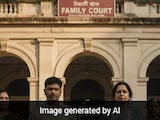Former Chief Justice of India (CJI) Dipak Misra today said a terminally-ill patient or a person in persistent vegetative state should not be made an "experimental object" and one must respect his dignity.
Referring to the Supreme Court's landmark verdict on passive euthanasia which recognised that a terminally-ill patient or a person in persistent vegetative state can execute an "advance medical directive" or a "living will" to refuse medical treatment, retired Justice Misra said if a person cannot die with dignity, it was akin to affecting his or her identity.
"Let us not make him (patient in persistent vegetative state) an experimental object. Let us respect his dignity and let us respect him humanity. I have always told that humanity is dignity and if I cannot die with dignity, you are affecting my identity," he said while addressing the gathering at the Agenda Aaj Tak function in New Delhi.
On March 9, a five-judge constitution bench headed by then CJI Misra had recognised that a terminally-ill patient or a person in persistent vegetative state can execute an "advance medical directive" or a "living will" to refuse medical treatment, saying the right to live with dignity also includes "smoothening" the process of dying.
The top court had observed that failure to legally recognise advance medical directives may amount to "non-facilitation" of the right to smoothen the dying process and the dignity in that process was also a part of the right to life under Article 21 of the Constitution.
The former CJI said he wanted to make people aware about the concept of passive euthanasia.
"My purpose is to make people aware. The law has empowered you and once the law has empowered you, you are empowered," he said.
He said it was very difficult for the immediate relatives to take a decision that such a patient will not be given any kind of medical treatment.
How can relatives say that medical aid should be stopped, "when the doctor says we will put the patient on ventilator and there is 50-50?", he said.
Retired Justice Misra said he knew how people were suffering and how families were ruined in such cases because they do not know what to do.
"If they do not spend money on treatment, the society will question," he said, adding that "this social conflict should be over".
In its judgement, the constitution bench had laid down principles relating to the procedure for execution of advance directive or 'living will' and also spelled out guidelines and safeguards to give effect to passive euthanasia in both circumstances -- where there are advance directives and where there are none.
In his verdict, the then CJI had noted that in case of a terminally-ill patient or a person in persistent vegetative state where there was no hope of recovery, "accelerating the process of death for reducing the period of suffering constitutes a right to live with dignity".















